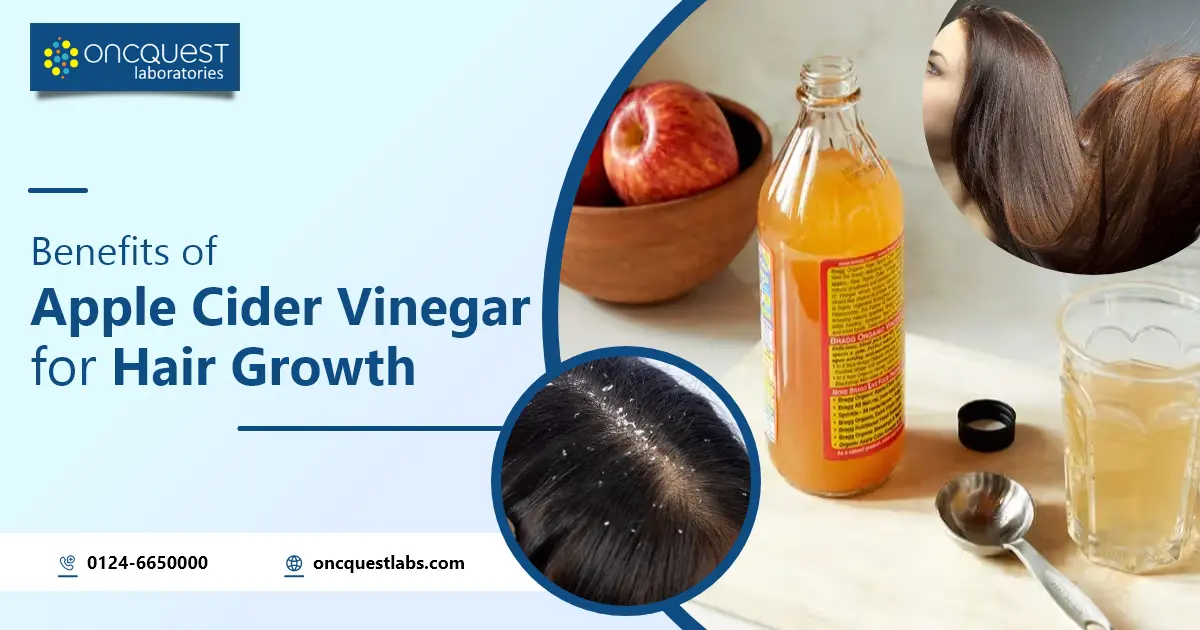Apple cider vinegar (ACV) is not just a kitchen staple; it’s also a celebrated component in the world of natural health and beauty remedies. Known primarily for its benefits to digestive health and weight management, ACV has also carved out a significant niche in hair care. Its natural properties can potentially transform hair health, promoting growth and enhancing the overall condition of your scalp and strands.
In this article, we’ll explore the specific benefits of ACV for hair growth. From maintaining the pH balance of the scalp to clarifying hair follicles and conditioning tresses, ACV offers a multitude of advantages for those seeking healthier, fuller hair. Whether you’re battling with dandruff, slow hair growth, or just want to give your hair a natural boost, understanding how to harness the properties of apple cider vinegar could be key to achieving your hair care goals. Let’s dive into how ACV can be a game-changer for your hair routine.
Contents
Composition of Apple Cider Vinegar
Apple cider vinegar (ACV) is made through the fermentation of apple cider, which transforms the sugars present in apples into alcohol. A secondary fermentation process then converts this alcohol into acetic acid, the primary active ingredient in vinegar. This intricate process not only produces a potent vinegar but also enriches it with various components beneficial for hair health. Here’s what makes ACV a valuable addition to hair care routines:
Key Components
- Acetic Acid: The star component of ACV, acetic acid, helps lower the pH of the scalp, mimicking the natural pH of the skin. This aids in sealing the hair cuticle, making the hair smoother, less prone to tangling, and more reflective, which enhances shine.
- Trace Elements and Vitamins: ACV contains trace amounts of vitamins B and C and minerals such as potassium, which are crucial for hair strength and overall health. These nutrients can help nourish the hair follicles and scalp.
- Antioxidants: ACV is rich in antioxidants like catechin, epicatechin, and gallic acid. These compounds help protect the scalp and hair from oxidative stress, which can lead to hair loss and weakened hair.
- Enzymes and Amino Acids: The fermentation process produces various enzymes and amino acids in ACV, which can contribute to hair and scalp health by promoting healing and repair.
Beneficial Properties
- Natural Antimicrobial: ACV has natural antifungal and antibacterial properties that help combat scalp infections and dandruff, which are common causes of hair loss and poor hair health.
- Detoxifying Effects: By helping to cleanse the scalp of buildup from styling products and sebum, ACV can improve the health of hair follicles, potentially leading to better hair growth.
Understanding the composition of apple cider vinegar elucidates why it is so effective in various hair care applications. Its natural acidity and nutrient-rich profile make it a multifunctional remedy that can promote not only healthier hair but also a healthier scalp.
Apple Cider Vinegar for Hair Benefits
The benefits of apple cider vinegar (ACV) for hair are manifold, offering a natural and effective solution for various hair concerns:
Improved Scalp Health
Apple cider vinegar (ACV) contributes to improved scalp health through its ability to balance pH levels and combat common scalp issues. Its acidic nature helps regulate the scalp’s pH, creating an environment that is less conducive to the growth of fungi and bacteria responsible for conditions like dandruff and scalp infections. ACV’s antimicrobial properties also aid in soothing itching and reducing inflammation, providing relief for those with sensitive or irritated scalps. Regular use of ACV as a scalp treatment can help maintain scalp health, promote a clean and balanced environment, and alleviate common scalp concerns, resulting in healthier and more comfortable hair growth.
Enhanced Hair Shine and Texture
Apple cider vinegar (ACV) contributes to enhanced hair shine and texture through its unique properties. The acidic nature of ACV helps to smooth the hair cuticles, resulting in a more polished and reflective surface that enhances shine. Additionally, by removing residue from hair products and excess oil, ACV clarifies the hair and scalp, leaving it feeling cleaner and lighter. This removal of buildup not only improves the appearance of hair but also enhances its texture, making it softer and more manageable. Regular use of ACV as a hair rinse or treatment can result in noticeably shinier, smoother, and healthier-looking hair.
Hair Conditioning
Apple cider vinegar (ACV) serves as a natural hair conditioner, enhancing the texture and sheen of your hair. Its acetic acid content helps close the hair cuticles, making strands smoother and less prone to tangling and frizz. This results in hair that’s not only easier to manage but also more lustrous and healthy-looking. Regular use of an ACV rinse after shampooing can prevent split ends and breakage by strengthening the hair, thus maintaining its integrity and promoting overall hair health.
Stimulated Hair Growth
Apple cider vinegar (ACV) is renowned for its potential to stimulate hair growth by promoting a healthy scalp environment and enhancing circulation to the hair follicles. Its acidic properties help balance the scalp’s pH, creating an optimal environment for hair growth. By unclogging follicles and removing excess oil and debris, ACV ensures that hair follicles are not inhibited by buildup or blockages. Additionally, the application of ACV to the scalp can increase blood circulation, delivering vital nutrients and oxygen to the hair follicles, thus stimulating hair growth. Over time, regular use of ACV as part of a hair care regimen can result in thicker, fuller hair growth, contributing to improved overall hair density and vitality.
Preventing Hair Loss
Apple cider vinegar (ACV) plays a significant role in preventing hair loss by fortifying the hair follicles and reducing breakage and split ends. Its acidic properties help to seal the hair cuticle, strengthening the strands and preventing them from becoming brittle and prone to breakage. Additionally, ACV helps to balance the pH level of the scalp, creating an environment conducive to healthy hair growth. By promoting blood circulation to the scalp, ACV stimulates the hair follicles, encouraging thicker and stronger hair growth over time. Regular use of ACV as a part of a hair care regimen can effectively reduce hair loss and promote the growth of healthier, more resilient hair.
Natural Detoxification
Apple cider vinegar (ACV) serves as a potent natural detoxifier for the hair and scalp, effectively removing impurities and buildup. Its acidic properties help dissolve product residue, excess oils, and pollutants that accumulate on the scalp and hair follicles over time. By gently cleansing the scalp and hair, ACV rejuvenates the follicles and promotes a healthier environment for hair growth. This detoxification process not only improves the appearance and texture of the hair but also helps prevent common issues such as scalp acne and follicle blockages. Regular use of ACV as a detoxifying treatment can revitalize the hair, leaving it refreshed, purified, and ready to absorb essential nutrients for optimal growth and vitality.
Stimulates Hair Growth
Apple cider vinegar (ACV) stimulates hair growth by enhancing blood circulation to the hair follicles. This improved blood flow ensures that hair roots receive the nutrients they need to thrive, promoting stronger and healthier hair growth. ACV also helps by maintaining a clean, healthy scalp, preventing clogged follicles that can hinder growth. Incorporating ACV into your hair care routine can effectively support the growth of thicker, fuller hair, while its natural properties help to keep the scalp environment balanced and conducive to hair health.
Incorporating ACV into your hair care routine can provide a range of benefits, leaving your hair looking and feeling healthier and more vibrant.
Apple Cider Vinegar for Dandruff
Balancing pH Levels
Apple cider vinegar (ACV) aids in balancing the scalp’s pH levels, which is crucial for dandruff management. Its acidic properties help regulate the pH balance of the scalp, creating an environment less conducive to the growth of dandruff-causing fungi. By restoring the scalp’s natural acidity, ACV helps alleviate dandruff symptoms and promote a healthier scalp.
Antifungal Properties
Apple cider vinegar (ACV) exhibits potent antifungal properties attributed to its high acetic acid content. This acid creates an environment on the scalp that inhibits the growth of fungi, such as Malassezia, which is often associated with dandruff. By effectively combating fungal overgrowth, ACV helps reduce dandruff symptoms and promotes a healthier scalp. Incorporating ACV into a regular hair care routine can provide relief from dandruff and contribute to overall scalp health.
Soothing Irritation
Apple cider vinegar (ACV) soothes irritation on the scalp due to its antimicrobial properties. It can alleviate itching and reduce inflammation associated with conditions like dandruff. When applied topically, ACV helps calm the scalp, providing relief from discomfort and irritation. This makes it an effective natural remedy for soothing scalp conditions and promoting overall scalp health.
Removing Flakes
Apple cider vinegar (ACV) effectively removes dandruff flakes from the scalp. Its acidic properties help loosen and dissolve the flakes, making them easier to rinse away. By applying a diluted ACV solution directly to the scalp and massaging gently, the flakes are lifted off, leaving the scalp cleaner and free from visible dandruff. Regular use of ACV can help prevent the recurrence of flakes and promote a healthier scalp environment.
How to Use Apple Cider Vinegar for Hair Growth
Using apple cider vinegar (ACV) for hair growth involves several practical steps and considerations to ensure effective results while maintaining scalp and hair health. Here’s a detailed guide on how to use ACV for promoting hair growth:
1. Preparing the Apple Cider Vinegar Solution
To begin, you need to prepare an appropriate ACV rinse solution:
- Dilution: Mix one part apple cider vinegar with three parts water. For example, you can use 1/4 cup of ACV with 3/4 cup of water. This dilution helps prevent the acidity of the vinegar from irritating the scalp.
- Optional Enhancements: To enhance the benefits and improve the scent, consider adding a few drops of essential oils such as rosemary or lavender, both known for promoting hair health and growth.
2. Applying the ACV Rinse
- After Shampooing: After you wash your hair with shampoo, gently squeeze out excess water from your hair.
- Application: Apply the ACV solution directly to your scalp and hair. You can pour it through your hair or use a spray bottle for more controlled application.
- Massage: Gently massage the mixture into your scalp for several minutes. This massage can stimulate blood circulation to the hair follicles, enhancing the nutritive benefits and promoting hair growth.
- Distribution: Make sure to distribute the solution evenly through your hair, from roots to tips.
3. Letting the Solution Act
- Waiting Time: Allow the ACV rinse to sit on your hair and scalp for about 3 to 5 minutes. This waiting period lets the acetic acid work on the scalp, ensuring that the pH is balanced and the hair cuticles are closed, which can reduce frizz and add shine.
4. Rinsing Out
- Rinse Thoroughly: After the waiting period, thoroughly rinse your hair with cool water. Cool water can help further seal the hair’s cuticle and enhance shine.
- Conditioner: If your hair tends to be dry, you might want to follow up with a conditioner. However, many find that ACV acts as a natural conditioner, so you might find you need less synthetic conditioner or none at all.
5. Frequency of Use
- Regular Use: For best results, use the ACV rinse about once or twice a week. Regular use can help maintain the health of your scalp and promote hair growth without over-drying your hair or stripping natural oils.
6. Monitoring Scalp and Hair Health
- Observe Changes: Pay attention to how your hair and scalp respond to the treatment. If you notice any irritation or dryness, you might need to adjust the concentration of ACV or reduce the frequency of use.
- Adjustments: Some hair types may need a weaker solution or less frequent applications. It’s essential to customize the treatment to fit your specific hair and scalp needs.
7. Precautions
- Patch Test: Always perform a patch test before applying ACV to your entire scalp, especially if you have sensitive skin.
- Avoid Eye Contact: Be careful to keep the mixture away from your eyes as the acidity can cause irritation.
By following these detailed steps, you can maximize the potential hair growth benefits of apple cider vinegar while keeping your hair healthy and vibrant. ACV is not only a natural way to enhance hair growth but also improves overall hair texture and scalp health.
Apple Cider Vinegar Hair Rinse: A Detailed Guide
Apple cider vinegar (ACV) hair rinses have become popular for their natural benefits, such as enhancing shine, balancing scalp pH, and reducing dandruff. Here’s how you can make and use an ACV hair rinse effectively.
Benefits of ACV Hair Rinse
- Balances Scalp pH: Maintains the natural acidity of the scalp, reducing issues like dryness and dandruff.
- Cleanses and Clarifies: Removes product buildup and residue, leaving hair fresh and clean.
- Adds Shine: Smooths the hair cuticles, enhancing shine.
- Detangles Hair: Makes hair easier to manage and reduces breakage.
- Reduces Dandruff: Helps to combat dandruff with its antibacterial and antifungal properties.
- Improves Hair Health: Promotes overall hair health by keeping the scalp clean and balanced.
How to Make an ACV Hair Rinse
Ingredients:
- 1-2 tablespoons of organic, raw, unfiltered apple cider vinegar
- 1 cup (8 oz) of water
Instructions:
- Dilution: Mix 1-2 tablespoons of ACV with 1 cup of water. Adjust the amount of ACV based on your hair type and tolerance.
- Optional Additions: Add a few drops of essential oils like lavender or rosemary for added benefits and a pleasant scent.
How to Use the ACV Hair Rinse
- Shampoo and Condition: Wash your hair with your regular shampoo and conditioner.
- Apply ACV Rinse: After rinsing out the conditioner, pour the ACV solution over your hair and scalp.
- Massage: Gently massage your scalp for a few minutes to ensure even distribution.
- Leave In: Let the solution sit for a few minutes.
- Rinse: Rinse out the ACV solution with cool water to help seal the hair cuticles.
- Dry and Style: Proceed with your usual hair drying and styling routine.
Tips for Using ACV Hair Rinse
- Patch Test: Before using, perform a patch test to ensure you don’t have an adverse reaction.
- Proper Dilution: Always dilute ACV to prevent scalp irritation.
- Frequency: Start with once a week and adjust based on how your hair and scalp respond. Avoid overuse to prevent dryness.
- Follow-Up Care: If your hair feels dry, use a light conditioner or hair oil after the ACV rinse.
Conclusion
Apple cider vinegar (ACV) can be a valuable addition to your hair care routine due to its natural ability to balance scalp pH, cleanse and clarify hair, add shine, detangle, reduce dandruff, and improve overall hair health. By using a diluted ACV rinse once or twice a week, you can harness these benefits while avoiding potential side effects such as dryness or irritation. Always start with a patch test and adjust the dilution and frequency based on your hair type and needs.
FAQs
How often should I use an ACV rinse on my hair?
Typically, once or twice a week is sufficient. Adjust the frequency based on how your hair responds and avoid overuse to prevent dryness.
Can I use ACV on color-treated hair?
Yes, but use with caution as ACV may cause some fading of hair color. It’s best to do a patch test and use a more diluted solution.
Should I use ACV before or after shampooing?
Use ACV after shampooing and conditioning. The rinse helps to remove any residual product and smooth the hair cuticles.
What type of apple cider vinegar should I use?
Use organic, raw, and unfiltered apple cider vinegar with the “mother” for maximum benefits.
Can ACV help with dandruff?
Yes, ACV’s antibacterial and antifungal properties can help reduce dandruff and maintain a healthier scalp environment.





